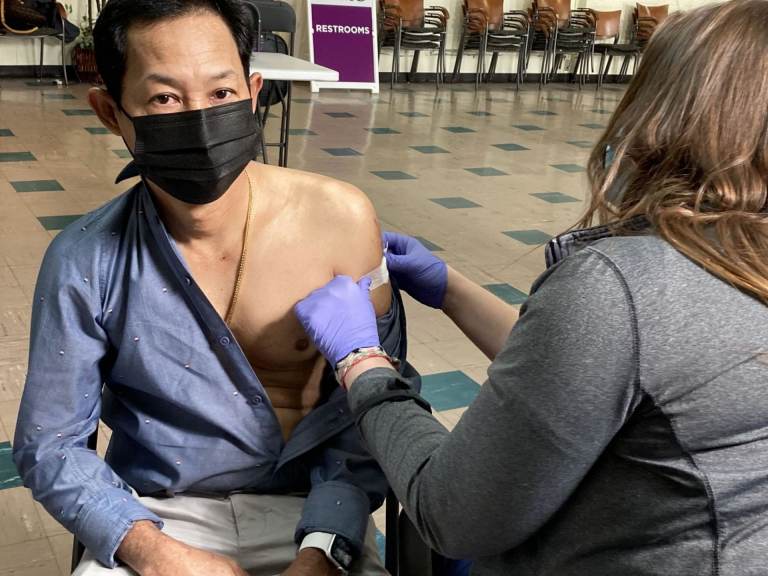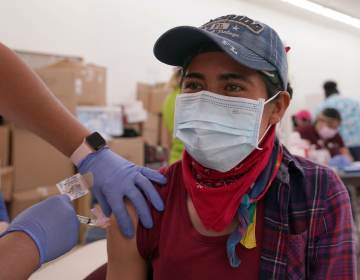As delta variant spreads in U.S., Pennsylvania COVID-19 vaccinations stall
More than half of Pennsylvanians are not immunized.

Tun Aye receives his COVID-19 vaccine from a UPMC provider at clinic held at Whitehall Presbyterian Church on April 24, 2021. (Sarah Boden/WESA)
Updated at 3:03 p.m.
–
This story originally appeared on WITF.
The number of people lining up for COVID-19 vaccines has slowed to a trickle, while almost half of Pennsylvanians remain unvaccinated and a more contagious version of the virus is spreading in parts of the U.S.
About 6.5 million people in Pennsylvania are immunized against the virus, according to the Centers for Disease Control and Prevention. That’s 51% of the state’s population. The nationwide average is 48%, CDC states.
Over 61% of adults in Pennsylvania are fully vaccinated, according to the health department. That number has barely moved in recent weeks. Health department spokesman Mark O’Neill said the rate of new first-time vaccinations has been slowing for the past two months.
The good news, O’Neill noted, is that COVID-19 cases, hospitalizations and deaths also are at their lowest levels since the virus arrived in the commonwealth in March 2020. That’s the direct result of people getting vaccinated.
O’Neill said health care leaders are working to reach holdouts, such as some younger adults.
“There are people who are not even necessarily against getting vaccinated, they just haven’t done it yet,” O’Neill said. “And they’re people we can certainly reach.”
Some others still have concerns about the virus, O’Neill said. A statewide messaging campaign, “PA Unites Against COVID,” is intended to educate people about the vaccines.
O’Neill said 5.3% of recent Pennsylvania cases were identified to be the delta variant — a more contagious, and more severe, version of the virus. Nationwide, that variant accounts for half of new cases.
That should be a warning to Pennsylvania, said Dr. Tom Kenyon, the Chief Health Officer of Project HOPE, a global health and humanitarian relief organization.
In less-vaccinated states such as Missouri and Arkansas, the variant has infections surging to levels not seen since winter, Kenyon noted.
The variant is also driving up cases among unvaccinated people in places as close to Pennsylvania as New York City, he added.
Kenyon said unvaccinated people — including children under 12, who aren’t eligible for the shot — are incubators for a virus that replicates inside their bodies billions of times each day. Every time the virus replicates, there’s a risk it could become vaccine-resistant.
“That’s what would be the doomsday scenario,” Kenyon said. “If we have a more infectious virus, and more lethal virus, and God forbid, one that evades vaccines, then we’re in big, big trouble.”
Fortunately — for now — vaccines remain incredibly effective against the delta variant, Kenyon added.
He said there’s wide consensus in the public health community that the “horrific scale” of hospitalizations and deaths seen in the U.S. last year shouldn’t happen again. “But what you’ll see is these smaller epidemics locally. We’re already seeing those crop up all over the country, in summer camps, in office buildings, in churches, you name it. Wherever people are unvaccinated.”
In Pennsylvania, the percentage of vaccinated adults varies greatly from county to county, Centers for Disease Control and Prevention data show.
Twenty-six of Pennsylvania’s 67 counties have “moderate” levels of community spread, the data show. Thirty-nine counties have low rates of transmission. Cameron County has a high rate.
More than 1.2 million people have tested positive for the virus in Pennsylvania. Nearly 28,000 have died from it.

Get daily updates from WHYY News!
WHYY is your source for fact-based, in-depth journalism and information. As a nonprofit organization, we rely on financial support from readers like you. Please give today.




![CoronavirusPandemic_1024x512[1]](https://whyy.org/wp-content/uploads/2020/03/CoronavirusPandemic_1024x5121-300x150.jpg)


